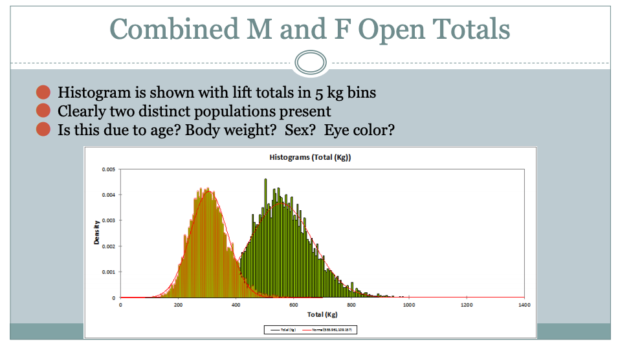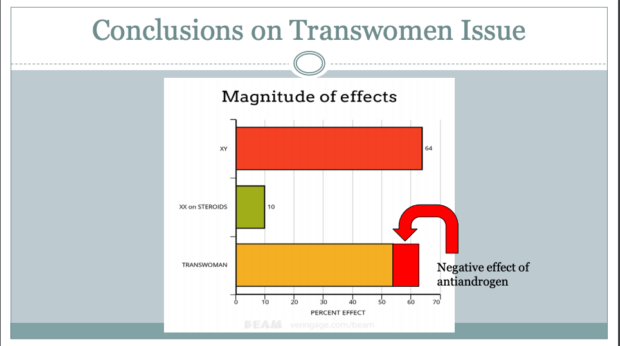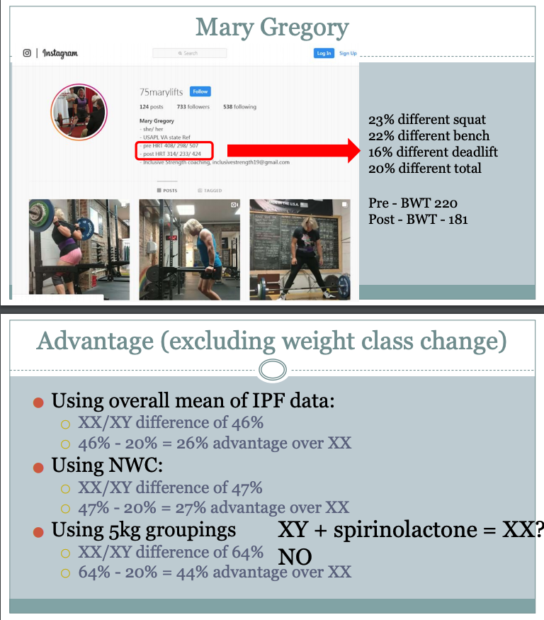The Real Story Behind USA Powerliftings Transgender Athlete Policy

A federation founded to provide drug free competition for powerlifters is grappling with the effects of a negative media spotlight powered by transgender advocates. These activists insist the federation allow biological men to compete with women, and use pseudoscience to whip the media into a frenzy on their behalf.
Female competitors who do not openly cheer the inclusion of transgender athletes in competition are being bullied and harassed by trans activists who say they are transphobic, bigoted and racist. Executive members of the federation are receiving threats and hostile messages on social media, in personal phone calls and in emails. Although the federation is one of several that restricts how transgender athletes compete, it has been especially singled out in dozens of news stories sympathetic to the activists on the other side of the policy.
The president of the federation has spent hours on the phone with journalists, and offered to travel in order to explain the position of the federation, but so far news outlets including The Washington Post and The Wall Street Journal are apparently unwilling to tell his side of the story. (RELATED: Media Reports On Transgender Athletes All Seem To Be Missing One Thing)
“The people who are advocating for transgender inclusion really seem to have a great deal of time and resources to approach sympathetic media and get their stories published,” Larry Maile, president of the USA Powerlifting federation, told The Daily Caller. “Our experience with the media has been that since they beat us to the press, basically their story is out there.”
YouTube/Public/Priscilla Ribic — “Larry Maile pulls 507lb Raw Natl Record”
Reporting on the transgender athlete dispute is strikingly one-sided. Whether its a feature in The Washington Post or a video segment on ABC News, or a writeup in the blog Deadspin, reporting on the subject tends to follow the same pattern — the perspective of a transgender athlete dominating a womens event is celebrated uncritically, while the perspectives of everybody else are either excluded from the story or dismissed.
Maile, 61, is one of the few critical voices that has made a dent in some of these stories, because of USAPLs firm and unapologetic approach to a dispute with JayCee Cooper, a transgender athlete barred from the federations womens competitions. Maile is an Air Force veteran and clinical and forensic psychologist who has been competing in powerlifting for more than 40 years, with a world championship win in 2000. He has coached at more than 50 international competitions, including as the head coach of the womens national and junior national teams, and is named to the North American Powerlifting Hall of Fame.
Although his federation has devoted a ton of time and energy into articulating and explaining its dealings with Cooper and its larger transgender policy, mention of the federations view is typically brief and oversimplified, and Mailes voice is excluded.
Sometimes the stories dont include USA Powerliftings perspective at all, because the reporters dont bother to ask. Vice News did a 7-minute video on Coopers dispute with the federation, but Maile says the outlet never reached out to him for comment.
He once spent two hours on the phone with a reporter at lifting magazine Muscle and Fitness who promised to write USAPLs side of the story, but the piece never materialized. He had reached out because Muscle and Fitness published a piece highly critical of USAPL. (Muscle and Fitness did not respond to a request for comment.)
The federations position on the matter is simple: Individuals who have gone through male puberty have a statistically significant advantage over women in powerlifting that cannot be mitigated by testosterone suppressors, and so they are banned from competing in womens events for the sake of a fair playing field. It has nothing to do with hate-based discrimination or politics. (RELATED: USA Powerlifting Sums Up The Transgender Athlete Dispute In One Paragraph)

JayCee Cooper YouTube/Public/Vice News — “How Trans Athletes Are Fighting Back After Being Banned By USA Powerlifting”
USA Powerlifting has enforced the policy as long as it has been aware of men and women undergoing transitions in the sport. In the years since the International Olympic Committee issued guidelines regarding transgender athletes in 2015, the federation has turned five people away for transition-related reasons. (The IOC recommends transgender athletes competing with women be required to maintain a lower testosterone level, but leaves the rules up to each federation for non-Olympic events.) After the dispute with Cooper thrust them into the media spotlight late last year, however, the federation commissioned a panel of experts to find out if its decision to ban them entirely from womens competitions is backed by science.
“What we really wanted were actual experts, not just people who had familiarity with the subject or who had taken a position, but people who were actually medical experts and statistical experts,” Maile told the Caller. The 9-member panel included Matthew Giese, a statistician, Dr. Huaiyu Tan, who holds a Ph.D. in neuroscience, and Dr. Scott Howell, who holds a Ph.D. in exercise physiology. Two of the panelists are not named because they are on active duty and deployed in inhospitable places. Some of them, including Maile, are members of the federation.
The panel looked at the available literature on the biological differences between men and women and then conducted a statistical analysis of internal data. Their goal was to find out what advantage men might have over women in powerlifting, and to see to what degree that advantage could be offset by drugs that suppress testosterone. Their findings were clear and the panelists unanimous: Powerlifters who have gone through male puberty have an overwhelming advantage over those who have not. (RELATED: Liberals Abandon Science In The Transgender Athlete Debate)
The panel wrote and published a report online, and Dr. Kristopher Hunt presented their findings at an annual meeting of the USA Powerlifting national governing body in May. Hunt said the studies the researchers looked at showed biological men have a permanent advantage in terms of muscle mass and power, higher bone mineral content and bone density, and larger nerve cells and signal size, because of a larger amount of connections between muscles and nerves.
WATCH:
Hunt also explained the analysis they did on powerlifting data, which represented 17,351 lifters and 1,300 competitions from January 2011 through March 2018. The information came from their own data, as well as data from the International Powerlifting Federation and its affiliates, and covered a range of skill and age levels, including U.S. youth competitions and international events. They grouped the data into categories based on sex (6,351 females and 11,000 males) and bodyweight, and looked at the lift totals.
Before puberty, they found the girls actually outperformed the boys by about 3 percent in the 8-9 age class, 15 percent in the 10-11 age class and more than 20 percent in the 12 and 13 age division. Post-puberty, however, the tables turned dramatically.
As the slide below shows, two definite groups emerged in that data in terms of strength, with sex as the primary indicator of strength. While there is some overlap, the differences are statistically significant.

Screenshot/USA Powerlifting — https://www.usapowerlifting.com/wp-content/uploads/2019/05/USAPL-TUE-Committee-Powerpoint-Report-2019.pdf
Men lifted more than women on average, and as their weight class increased, that effect became more pronounced. On average and depending on how they sliced the data, they found men have between a 46 percent and 64 percent strength advantage over women. Those numbers are key, because the available research on men who transition to women by means of testosterone blockers indicates they experience about a 10 percent drop in strength as a result. So even their most conservative analysis of the data would indicate a man on testosterone blockers still has as much as a 36 percent advantage over a woman.

Screenshot/USA Powerlifting — https://www.usapowerlifting.com/wp-content/uploads/2019/05/USAPL-TUE-Committee-Powerpoint-Report-2019.pdf
“The transgender advocate communitys assertion is that if you just reduce testosterone, performance comes down 10 percent, therefore all differences will be mitigated,” Maile told the Caller. “Our counter argument is that the differences between men and women are so significant in powerlifting, because of the nature of the activity. Its really purely a strength activity, even negating technique, it really is all about strength and leverage and body configuration.”
Anecdotal data from Mary Gregory, a biological male who posted weight totals from competitions before and after transitioning, illustrates the significance of their findings. The data Gregory posted on Instagram showed a 20 percent drop overall in her lifts after she began suppressing testosterone, twice the disadvantage USAPL found as the norm in biological men. But Gregory is still nowhere near offsetting their conservative estimate of a 46 percent advantage from male puberty.

Screenshot/USA Powerlifting — https://www.usapowerlifting.com/wp-content/uploads/2019/05/USAPL-TUE-Committee-Powerpoint-Report-2019.pdf
Hunt concluded in his presentation: “The differences [between biological men and women] are so significant that an immutable advantage is conferred in powerlifting by being male, even for a brief amount of time through puberty.”
The committees work stands out in terms of its rigor and statistical significance, especially when compared to other studies on transgeRead More – Source
[contf]
[contfnew]

The daily caller
[contfnewc]
[contfnewc]

















